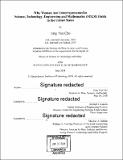| dc.contributor.advisor | Richard C. Larson. | en_US |
| dc.contributor.author | Cho, Jung Yun | en_US |
| dc.contributor.other | Technology and Policy Program. | en_US |
| dc.coverage.spatial | n-us--- | en_US |
| dc.date.accessioned | 2018-09-17T15:49:21Z | |
| dc.date.available | 2018-09-17T15:49:21Z | |
| dc.date.copyright | 2018 | en_US |
| dc.date.issued | 2018 | en_US |
| dc.identifier.uri | http://hdl.handle.net/1721.1/117904 | |
| dc.description | Thesis: S.M. in Technology and Policy, Massachusetts Institute of Technology, School of Engineering, Institute for Data, Systems, and Society, 2018. | en_US |
| dc.description | Cataloged from PDF version of thesis. | en_US |
| dc.description | Includes bibliographical references (pages 94-106). | en_US |
| dc.description.abstract | The issue of women's underrepresentation in science, technology, engineering and mathematics (STEM) fields in the United States has recently gained significant interest and accordingly, a great increase in the body of literature on this topic. A review of the literature reveals that the issue is a complex phenomenon with a myriad number of causes. These causes may be socioeconomic or cultural influences, or they may be specific events in women's educational or occupational timeline such as first-year college and university STEM classes. This thesis will use the following two themes to weave through and present the existing body of research: (1) STEM fields are riddled with gender stereotypes, which make many women uncomfortable and feel like they do not belong; (2) a gender confidence gap exists in STEM fields and discourages women from entering or further pursing STEM. An examination of gender composition of STEM fields across different countries validates these two themes as well. Finally, this thesis will end with a discussion of several potential strategies for increasing the representation of women in STEM. | en_US |
| dc.description.statementofresponsibility | by Jung Yun Cho. | en_US |
| dc.format.extent | 106 pages | en_US |
| dc.language.iso | eng | en_US |
| dc.publisher | Massachusetts Institute of Technology | en_US |
| dc.rights | MIT theses are protected by copyright. They may be viewed, downloaded, or printed from this source but further reproduction or distribution in any format is prohibited without written permission. | en_US |
| dc.rights.uri | http://dspace.mit.edu/handle/1721.1/7582 | en_US |
| dc.subject | Institute for Data, Systems, and Society. | en_US |
| dc.subject | Engineering Systems Division. | en_US |
| dc.subject | Technology and Policy Program. | en_US |
| dc.title | Why women are underrepresented in science, technology, engineering and mathematics (STEM) fields in the United States | en_US |
| dc.type | Thesis | en_US |
| dc.description.degree | S.M. in Technology and Policy | en_US |
| dc.contributor.department | Massachusetts Institute of Technology. Engineering Systems Division | |
| dc.contributor.department | Massachusetts Institute of Technology. Institute for Data, Systems, and Society | |
| dc.identifier.oclc | 1051218732 | en_US |
